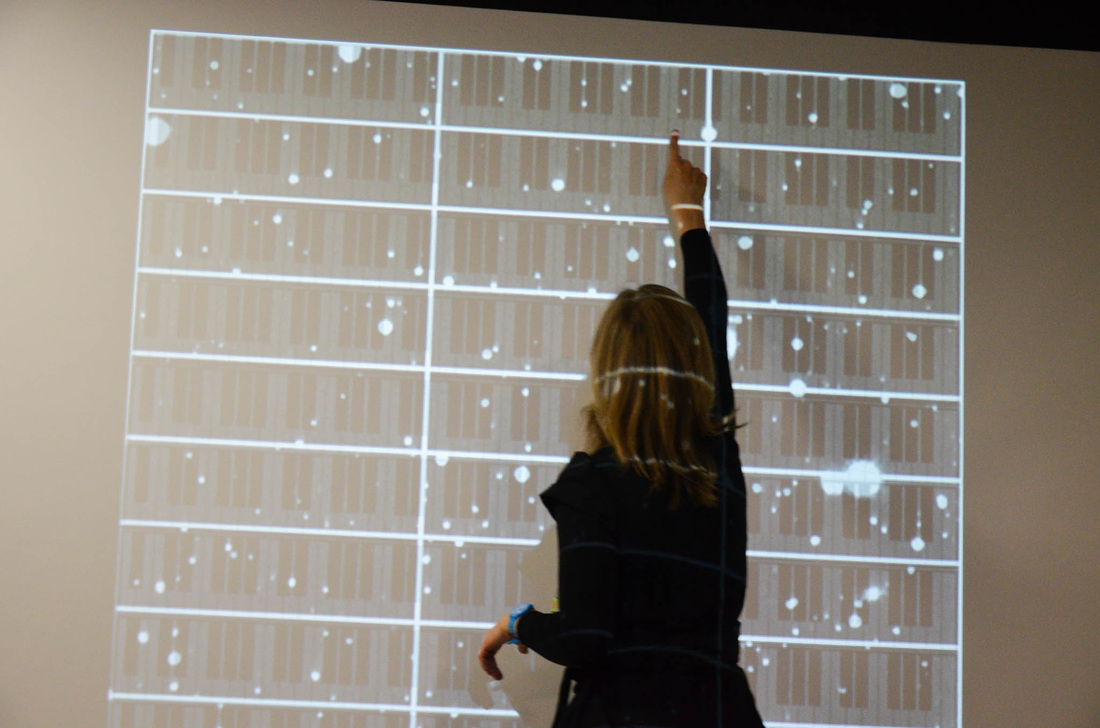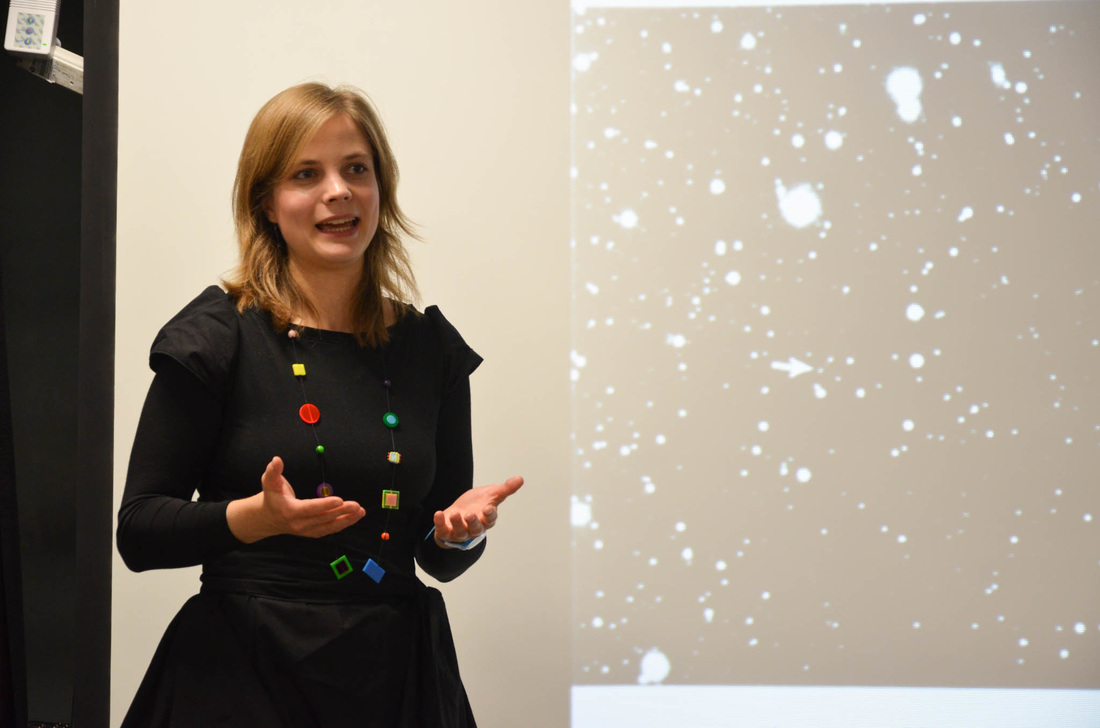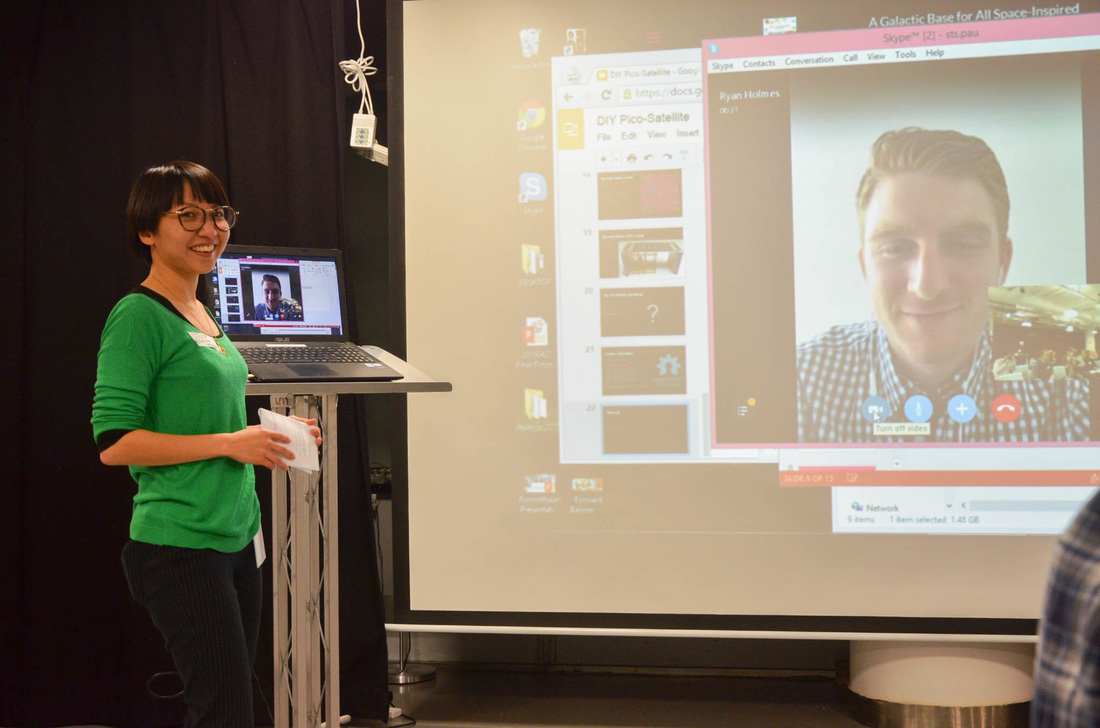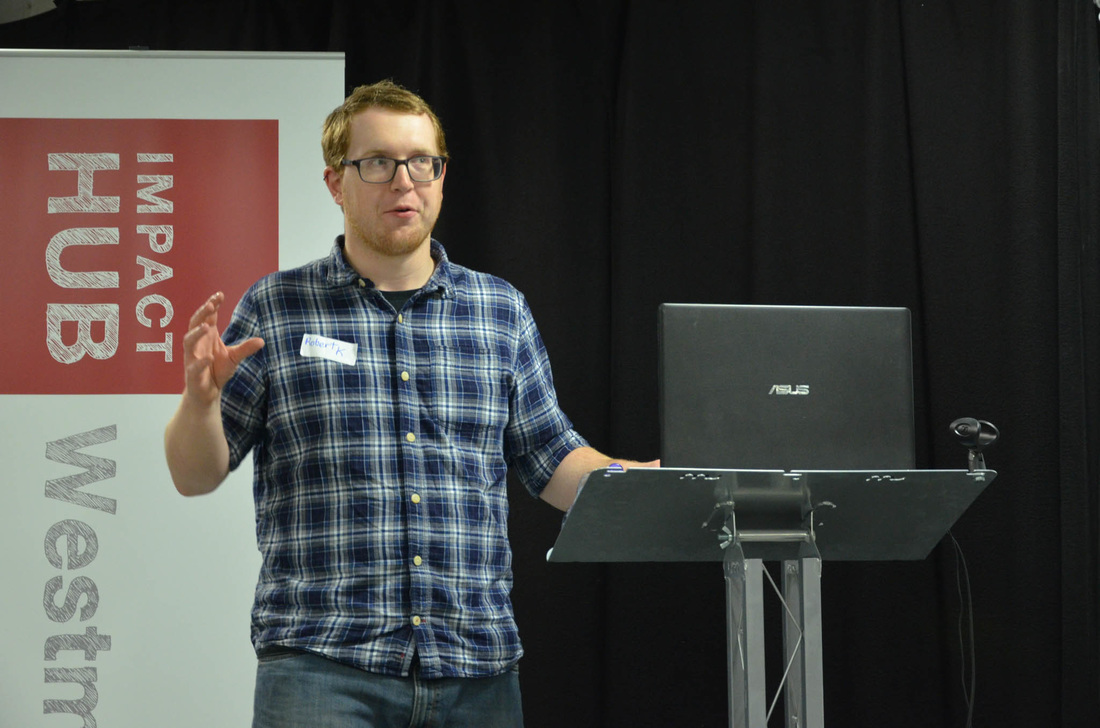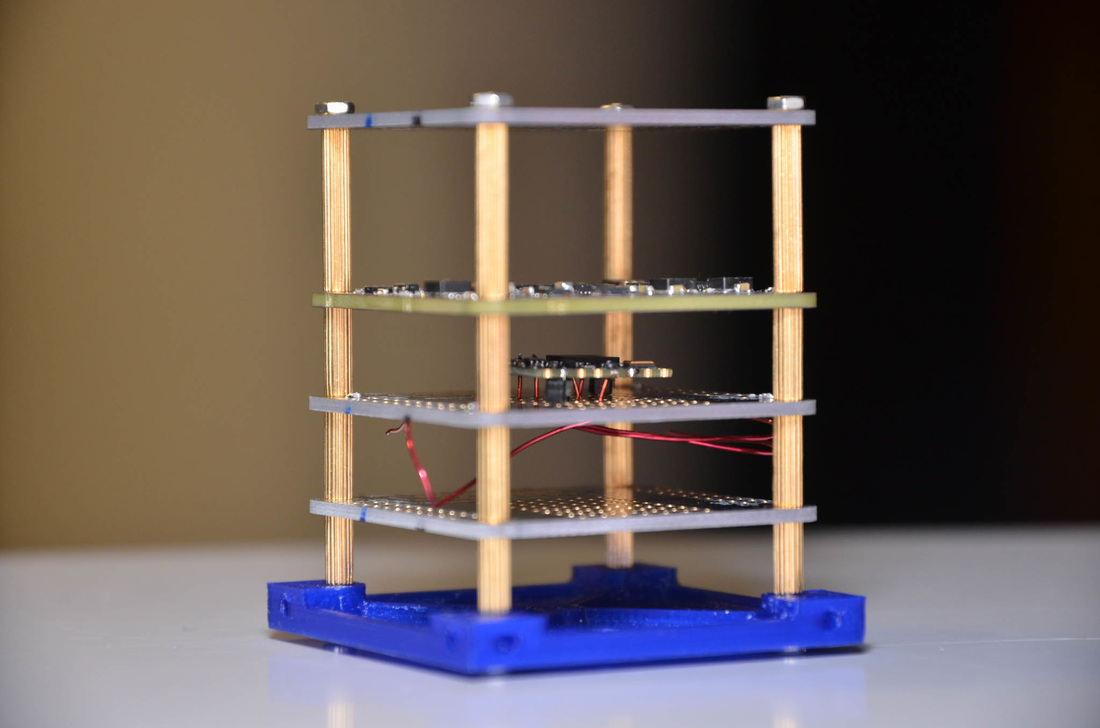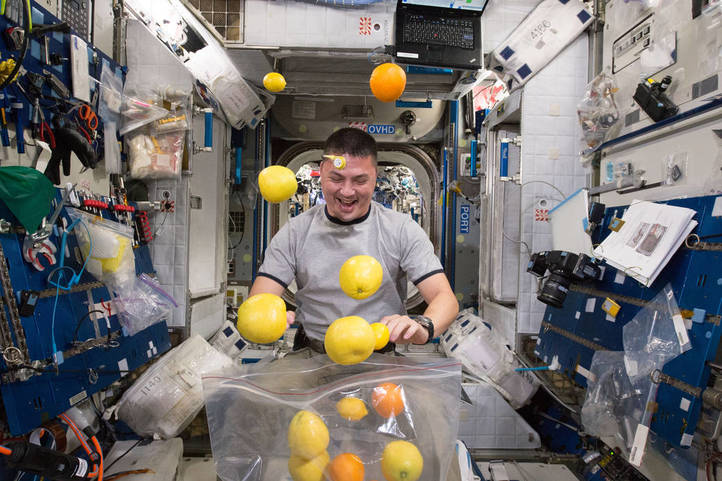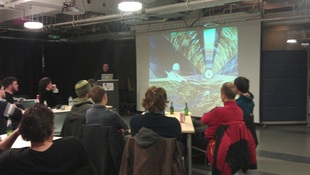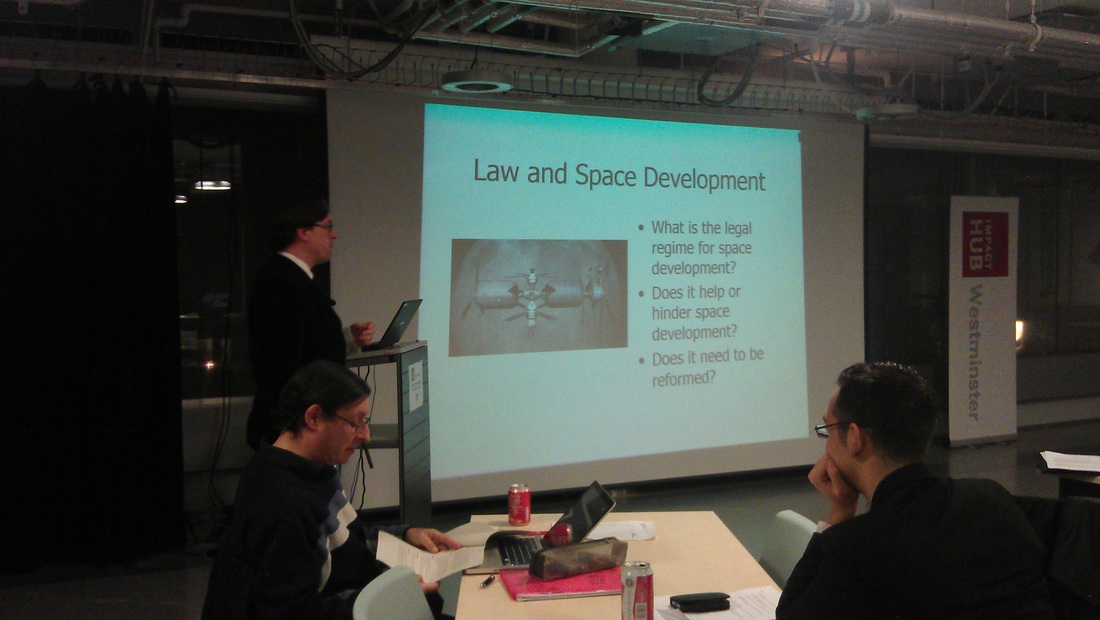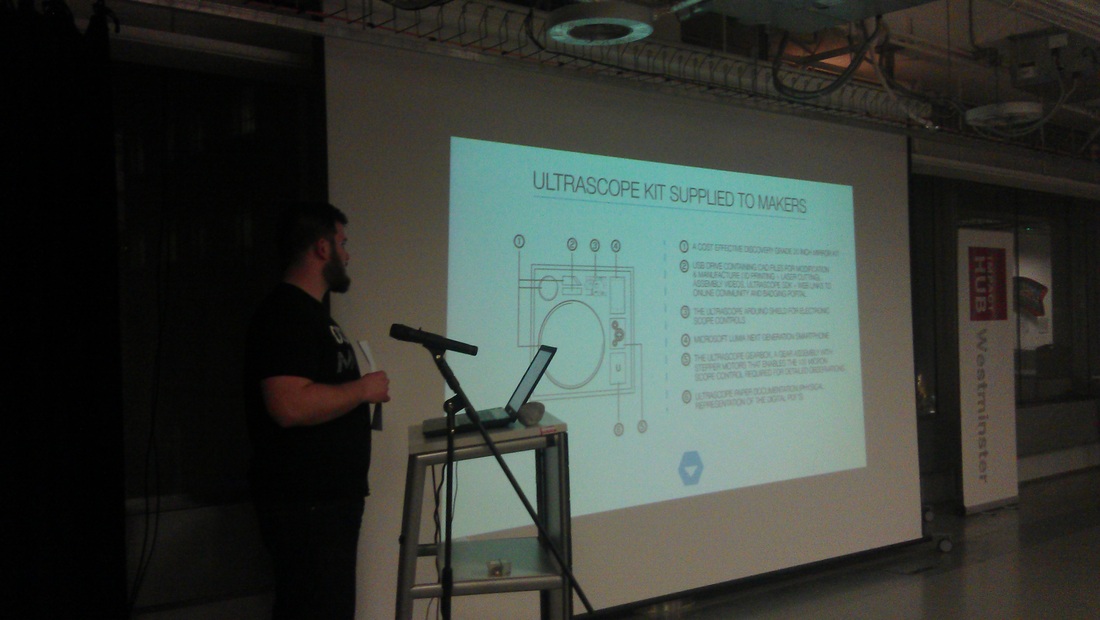|
On the 5 Oct 2015, Space Town Hall celebrated its one year old! It happened to be on the UN declared World Space Week too. It was a feast for our ears, eyes and having the pleasure to hold a spacecraft in our hand, plus beer, games and cakes! We started with a game over networking and went into the most accessible content at Space Town Hall to date. The content we have at our birthday clearly illustrated the way we would like to go forward going: more diversity where space is part of every profession! Take a look at Minna Nygren explaining the process of translating scientific photos to graphic score: Not only that we get to understand the process of composing a graphical music score, we also get to hear a full playback of Charon and Pluto, a Planetary Waltz, a very beautiful piece by Catherine Kontz and Minna Nygren. The piece was commissioned by the Center of Planetary Science, the new work received its premiere on the 24th of June 2015 at An Evening with the Planets event at UCL by pianists Valentina Pravodelov and Kerry Yong. All that, plus a tale of collaboration between two accomplished contemporary classical music composers in the world where superstar-ness is valued above all. After enjoying the beautiful music, we dialed our our guest from San Francisco in for a chat: Ryan Holmes, CEO of SpaceVR, a recently successfully funded kickstarter project to bring space experience to everyone to the ground, using virtual reality! See what I mean? Space is not always about going out there, it's also about bringing the experience in! Many congratulations again Ryan, looking forward to seeing your cameras off into International Space Station and beyond. On the note of sending things into space, we also have Rob Karpinski, a committed maker who DIY'ed many things electronics including an open-sourced satellite! Rob is also our regular participant at DIY Spacecraft Controls and a member of Cambridge Makerspace. We had a very accessible history lesson on satellites, specifically on their sizes. Look at this satellite, it's 5 cm widel: All photos by Daniel Elson. Presentation from Rob can be found here. Missed it? Sign up here and keep an ear on our next event. (We are more than low volume in our communications, so watch out or you might miss it again) Finally, thanks to our venue sponsor Impact Hub Westminster and their very friendly and professional team for hosting us, Citizen Inventor for sponsoring the food and drink, a special thanks to Daniel for photography.
See you next time for more space inspiration.
0 Comments
All of those will be at Space Town Hall on 5 Oct in London! Space is a diverse topic, as this pop up Space Town Hall event illustrates. More over, space curious, enthusiast and technologist, the floor is open for you there too. Celebrate diversity in citizen space projects/enterprise with us Space Town Hall's one year old birthday at the World Space Week 2015:
We have a lot to celebrate, so come and join us in central London at Impact Hub Westminster: To get a feel for things, check out our logbook here - but we are always experimenting, so expect something different again! Space Town Hall is a global common place for citizens, regardless of background, to join up and co-develop your space inspired projects/ideas. Space Town Hall pops up as regularly as it's demanded and outside of pop up events, there's a continued presence online at www.spacetownhall.com.
Space Town Hall will be one year old in the World Space Week 2015!
Image Credit - NASA
The first ever Space Town Hall event was at World Space Week 2014 at Hub Westminster, London and we are going to have our one year old Space Town Hall event at World Space Week 2015 at Hub Westminster too!
Space Town Hall is a community programme for all space curious, enthusiasts and makers to come together, physically in London and earth-wide online. Why Space Town Hall? Citizen Inventor's space related activities has pre-date Space Town Hall where we have been to European Space Agency's Technology Center at Noordwijk and hanging out (G+) with NASA discussing about interplanetary internet. Space Town Hall was set up last year as a programme that is dedicated to space and space only matters. Space Town Hall is a community programme for all space curious, enthusiasts and makers to come together, physically in London and earth-wide online. Space is a borderless place and we want to see every citizen space project and authentic mission to be successful. Part of our goal is to help space projects to be discovered and to find their contributors - at our town hall events. The other part of our goal, is to learn and develop our space tech skills, regardless of background - at our co-learn events - where we hack our way to space! Not only that, we threw together a fete in the summer to have some fun and celebrated a great multidisciplinary mix that extends far and wide: the Galactic Fete! Now, imagine we are all on the same spaceship. What worked well for you last year? What else would you want to see happening? Tell us: (if the embedded form below doesn't work, please tell us here) Pssst, want to be part of our crew and fly this space-ship with us? Our flagship get-together, Space Town Hall, made a return after the launch! Thanks to the number of citizens who has been showing their support by their presence, sponsorship and volunteering effort, crew. We say this every time, this time too, this event has been successful because of your support. Thank you. Space is a really wide topic, once again we covered everything from the engineering work on Earth's surface to the concepts of law and colony in the galaxy, from redeveloping heritage space colony studies to 3D printing telescope for a gamified astronomy vision. All with actions to follow and sign ups, as usual. We kicked off the evening with space colony research at the BIS (The SPACE project), lead by Jerry Stone FBIS, who is also a presenter on astronomy and space exploration since 45 years ago whilst still at school!
There's so much research done by the BIS team, in 30 minutes, Jerry has summarised the study thus far and presented several colony design with latest feasibility analysis and a modern updates to these designs based on these studies, with a great level of technical details too. Bringing space colonies "from imagination to reality", true to BIS's tag line. That lead us nicely into the topic of Space Law! "Space law is of crucial importance because as well as the constraints of physics and engineering, any activities in space are always going to be governed by the law. Space development isn't going to take place in a wild, chaotic place without legal rules! " - Adam Manning Policies has always been like a maze, a maze as vast as space, we feel. As citizen of Earth and of the wider Space, knowing our rights, or lack of, is surely essential but few of us would want to read through the original text of the law, the statutes or treaties themselves. Adam Manning, our speaker of the law, has taught himself space law and has been sharing his learning and research to the BIS Space Colony project and the wider audience in the open internet at his blog @ProjIon. In this event, we were given a digested understanding of Outer Space Treaty and Moon Treaty (also known as Agreement Governing the Activities of States on the Moon and Other Celestial Bodies), working things out from the ground up - from the Common Laws. Feeling like following up from the presentation? Here is a more detailed examination of the law of Outer Space from the context of private and commercial space development from Adam. After working things out at space, Jon Rushton from Open Space Agency brought us back looking up to Space from Earth's surface and talked us through the design and development of Ultrascope - a kit-set telescope that would reduce the cost of pro-level astronomy by an order of magnitude, provides the maker/astronomy community with a solid starting point to build and adapt a telescope. The design of Ultrascope focused on rapid manufacture technologies such as 3D printing and laser cutting to bridge the skill gap required for machining high tolerance components. The main goal of this project is to increase the number of astronomers. Open Space Agency believes that with the development of technology and the open source movement we will eventually be able to reduce the barrier to entry for owning a telescope powerful enough for performing follow up observations on asteroids. So, beta testing sign up is on - happy start gazing! The presentation is available here: http://prezi.com/8hvfyy67allh/?utm_campaign=share&utm_medium=copy&rc=ex0share. With that, we moved over to a quick summary from Stephanie Pau @citizeninventor on our co-learning on DIY Orientation Thruster and follow up space discussions with some more inspiration from more beers - thanks to International Space University for it's generous sponsorship and Hub Westminster for keeping its door open to us till late! We had people from space and non space related industry, professionals and students, policy, research, business, technical and creative expertise in one room. It was a truly multi-disciplinary mix of people and we are very pleased to see the great mix of people in the room. It has been a special evening to have Fabian joining us from BBC world service technology programme on the evening. Are you a space journalist/science communicator? Can you record our events? We're on the look out for crew! Drop us a line: If you are ready to take the next one on,
The first 2 speakers of the Space Town Hall #2 (unveiled in earlier posts here and here) definitely has the galatic impact on their focus! Our third speaker will bring us back to Earth and take is through building telesope using 3D printing etc, the rapid designer-prototyper: Jon Rushton.
Jon Rushton is a Brunel Industrial design graduate. Project Ultrascope is Jon's handy work! The main goal of this project is to increase the number of astronomers by the development of open source technology, reducing the barrier to entry for owning a telescope powerful enough for performing follow up observations on asteroids. "The scope we are building at the moment is not at this level (yet) but we are making progress on reducing the barrier to entry by releasing the free plans and instructions to download and build an ultrascope in the near future. The manufacture methods also reduce the skill required by the maker as it uses ever developing rapid manufacture techniques such as 3D printing and laser cutting for the bulk of the components (as well as bought in components). We believe that the unique points of interest for this project are the freedom to customise and improve on the design, access to an open community of maker astronomers (of which there is already a budding number) from a great starting point and its strong cross subject (science and Design & Technology) in school project applications. The project so far has been a great success and we have 1,600 sign ups in the wings to build the scope when it is released." Want to hear more or have a burning question to ask? RSVP now and join us on Space Town Hall #2, 10 Feb evening at Hub Westminister. The Space Colony project that Jerry Stone will be presenting covers everything from civilization, biodiversity and technology, but with any civilization, there's etiquette and Adam Manning would fill in our knowledge gap on that!
Adam is the founder of two local environmental groups. In his spare time, he helps clearing up rubbish on a beautiful beach in sunny Southampton. Working as a Litigation Solicitor with a passion for space development, he research and taught himself space law. Whilst he's at it, he shares his learning through his blog - gold star for being a good citizen! As part of the work carried out for Project SPACE, the British Interplanetary Society's study project on space colonization, he has been focusing on analysing the laws of Outer Space as they apply to the utilization of the resources of space and ultimately the settlement of space, if you'd like to do some prep before the Space Town Hall #2, check out his post here: http://projection3.blogspot.co.uk/2015/01/legal-issues-in-space-settlement.html RSVP to Space Town Hall #2 here: http://www.meetup.com/CitizenInventor/events/212269332/ Don't miss your chance to raise your hand and ask questions re Space Law! Finally! The long awaited Space Town Hall #2 is coming up on the 10 Feb at our usual place Westminster Hub. This time, we are going to continue on our broad and multidisciplinary approach to our shared journey to space! For the futurist, and in fact, any citizen, here is your chance to shape the future! It's been said that "The future is created by what you do today, not tomorrow", well, how about we try to join one of our speaker and create that future on the 10 Feb? Talking space colony Jerry Stone FBIS is a freelance presenter on astronomy and space exploration. He gave his first talk on space over 45 years ago whilst still at school. Now he runs Spaceflight UK and speaks all over the UK and abroad, and also presents space workshops in schools. He is the leader of the British Interplanetary Society's SPACE Project. Back in the 1970s, plans were developed for large-scale space colonies that could house upwards of 10,000 people. Establishing these habitats could help solve many of the problems that are still with us today down on Earth. The SPACE Project (Study Project Advancing Colony Engineering) aims to update those plans in light of the advances in technology over the last 40 years. This is a very wide-ranging project, including town planning, ecology, etc, as well as the engineering aspects. Would you like to help plan mankind’s future in space? Don't miss your chance to make a GALATIC impactMore Speakers to unveil... yes, the universe is full of mysteries! We'll post more detail closer to date. At Space Town Hall, we promise you will have the chances to join hands on projects.
RSVP here: http://www.meetup.com/CitizenInventor/events/212269332/ PS: Would anyone be able to help us to film the event? Space Town Hall launched during World Space Week 2014 on 6 Oct 2014. Headlined by our 3 space speakers: Chris Welch from International Space University, Ray Bainbridge from Tranquility Aerospace and Radim Badsi from Open Cube Project, supported by the generous sponsorship from Hub Westminster (venue) and International Space University (beer and pizza), we had a successful lift off together with a diverse community of around 40. Space exploration often sounds very technical but the diversity in skills and people required is often much wider than what we usually associate with. Steph mentioned the need for fashion designer and material scientist in an open source space suit project (EXOSKN) at the intro talk and Chris has illustrated the diversity at the international Space University: lawyers and engineers from different cultures worked closely together to make space projects happen. We've opened with Professor Chris Welch, Head of the Space Mafia (and the Director of MSc Programs at the International Space University). Our first ever talk covered so many projects and initiatives from sci-fi to reality that is just not possible to take enough notes of. From International Space University on Earth, the Space Elevator and ArduSAT that its graduates went onto create, all the way to an interstellar worldship team project and space events that you can help with: World Space Week, SpaceUP:UK, Yuri's night... Chris asked what we can we all do today and in the near future to plant the seeds to enable such a future. From then, we went very hands on in technical terms and the embedded developers (Arduino and Beaglebone) are in for a treat, in fact, two treats. Ray Bainbridge, the founder and CEO of Tranquility Aerospace talked about the development of Devon One, a vertical take off/landing reusable sub-orbital launcher and opened up the study of controlling such system using open source hardware (watch this space, this will be the first of a very exciting initiative). How many times in your life do you get to learn about launch equipment designs, hands on?! Last but not least, Radim Badsi, an entrepreneur and the project manager for Open Cube Project gave an overview of cubesat, the nanosatellites that have attracted increasing interest from the research community and the commercial space industry in recent years and invited the community to review the project and contribute enhancements and fixes. Radim has also announced the opportunity to learn to build cubesats, hands on, through a new project initiative: Space Invader Cube. Mixing games and cubesat learning experience, delicious. On top of exchanging ideas with regards to space technology development and exploration, we really would like to emphasis our focus on doing things hands on. To this end, all of our speakers at the launch has each talked about a different space topic and also offered an opportunity to sign up to space project on the spot! If you have missed it, you can still sign up to those hands on projects (your curiosity and a willing pair of hands is all it takes):
After all there's no boundary lines drawn in space, so let's not impose such things in the Space Town Hall. If you belong to other space organisations, do not be shy, Space Town Hall is open to all. It is in fact all the better that the Space Town Hall includes every open minded citizen! So bring your community. open projects, half baked idea along and let's start forming a Town Hall for all - regardless of what skills you think you don't have! Not to forget to mention that Chris is normally based in Strasbourg and Radim in Berlin, all of our speakers has travel from a distance to join us at the event. We'd love to hear from you wherever you are. We are earmarking January 2015 for the next one, stay tuned! PS: Did I hear you say there's a lack of photos? Well let us know if you've taken some - in fact, even better, just add them here. Space Town Hall is an initiative by Citizen Inventor to create an channel for citizens of space to come together and help make space development and exploration a community thing. We recognized that being a virtual community is not enough, and Space Town Hall is a regular get-together for as long as the interest of the community last
You've waited all these time and finally we are letting it out. Our space speakers and talks at the Launch:
Chris Welch @ProfChrisWelch from ISU @ISUnet Although we cannot do it yet, one day we may wish to send humans out to the stars. This talk will outline ISU and its interstellar worldship team project and ask what we can we all do today and in the near future to plant the seeds to enable such a future? About the speaker: Chris Welch is professor of spacecraft engineering at the International Space University in Strasbourg, France. He is also Vice President of the British Interplanetary Society and deputy Chair of the Institute for Interstellar Studies' Advisory Council. Ray Bainbridge @TranquilityAero How often do you get to see the thrusters parts and landing gear of a spacecraft launcher?! Ray will be offering the chance to write C++ for Tranquility Aerospace's thruster array and landing gear, which will be present at the event too! About the speaker: Ray is a prolific entrepreneur with investments in several emerging technologies companies within the UK and Europe and is the CEO of Tranquility Aerospace. Ray has 38 years engineering experience and for the past 13 years has also acts as a manufacture and design consultant in cutting edge technologies. Tranquility Aerospace Ltd is currently developing its own vertical take-off, vertical landing, reusable rocket for the launching of payloads both suborbital and LEO from the UK. Radim Badsi at OpenCubeProject Radim will present an overview of recent technology developments and advances in the nanosatellite sector. Current trends, insights, future opportunities and challenges will be discussed. He will introduce the OpenCube Project, a collaborative, community-driven effort to develop an open-source CubeSat platform. About the speaker: Radim is an entrepreneur, engineer and space enthusiast. His company, Innoflair, is specialised in research and development of innovative ground segment technologies, including efficient spacecraft telemetry archival and anomaly detection. He is the project manager of an open source project developing a plug-and-play CubeSat platform called OpenCube. |
Categories
All
|
